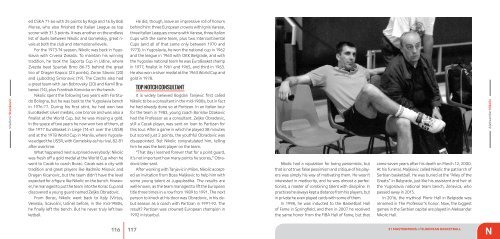ALEKSANDAR NIKOLIC_31 Masterminds of European Basketball
You also want an ePaper? Increase the reach of your titles
YUMPU automatically turns print PDFs into web optimized ePapers that Google loves.
Vladimir Stankovic<br />
ed CSKA 71-66 with 25 points by Raga and 16 by Bob<br />
Morse, who also finished the Italian League as top<br />
scorer with <strong>31</strong>.5 points. It was another on the endless<br />
list <strong>of</strong> duels between Nikolic and Gomelskiy, great rivals<br />
at both the club and international levels.<br />
For the 1973-74 season, Nikolic was back in Yugoslavia<br />
with Crvena Zvezda. To maintain his winning<br />
tradition, he took the Saporta Cup in Udine, where<br />
Zvezda beat Spartak Brno 86-75 behind the great<br />
trio <strong>of</strong> Dragan Kapicic (23 points), Zoran Slavnic (20)<br />
and Ljubodrag Simonovic (19). The Czechs also had<br />
a great team with Jan Bobrovsky (20) and Kamil Brabenec<br />
(14), plus Frantisek Konvicka on the bench.<br />
Nikolic spent the following two years with Fortitudo<br />
Bologna, but he was back to the Yugoslavia bench<br />
in 1976-77. During his first stint, he had won two<br />
EuroBasket silver medals, one bronze and was also a<br />
finalist at the World Cup, but he was missing a gold.<br />
In the space <strong>of</strong> two years he now won two <strong>of</strong> them, at<br />
the 1977 EuroBasket in Liege (74-61 over the USSR)<br />
and at the 1978 World Cup in Manila, where Yugoslavia<br />
edged the USSR, with Gomelskiy as his rival, 82-81<br />
after overtime.<br />
What happened next surprised everybody: Nikolic<br />
was fresh <strong>of</strong>f a gold medal at the World Cup when he<br />
went to Cacak to coach Borac. Cacak was a city with<br />
tradition and great players like Radmilo Misovic and<br />
Dragan Kicanovic, but the team didn’t have the level<br />
expected for a figure like Nikolic on the bench. However,<br />
he managed to put the team into the Korac Cup and<br />
discovered a young guard named Zeljko Obradovic.<br />
From Borac, Nikolic went back to Italy (Virtus,<br />
Venezia, Scavolini, Udine) before, in the mid-1980s,<br />
he finally left the bench. But he never truly left basketball.<br />
He did, though, leave an impressive roll <strong>of</strong> honors<br />
behind him: three <strong>European</strong> crowns with Ignis Varese,<br />
three Italian Leagues crowns with Varese, three Italian<br />
Cups with the same team, plus two Intercontinental<br />
Cups (and all <strong>of</strong> that came only between 1970 and<br />
1973). In Yugoslavia, he won the national cup in 1962<br />
and the league in 1963 with OKK Belgrade, and with<br />
the Yugoslav national team he was EuroBasket champ<br />
in 1977, finalist in 1961 and 1965, and third in 1963.<br />
He also won a silver medal at the 1963 World Cup and<br />
gold in 1978.<br />
Top-notch consultant<br />
It is widely believed Bogdan Tanjevic first called<br />
Nikolic to be a consultant in the mid-1980s, but in fact<br />
he had already done so at Partizan. In an Italian tour<br />
for the team in 1983, young coach Borislav Dzakovic<br />
had the Pr<strong>of</strong>essor as a consultant. Zeljko Obradovic,<br />
still a Cacak player, was sent on loan to Partizan for<br />
this tour. After a game in which he played 38 minutes<br />
but scored just 2 points, the youthful Obradovic was<br />
disappointed. But Nikolic congratulated him, telling<br />
him he was the best player on the team.<br />
“That day I learned forever that for a point guard,<br />
it’s not important how many points he scores,” Obradovic<br />
later said.<br />
After working with Tanjevic in Milan, Nikolic accepted<br />
an invitation from Boza Maljkovic to help him with<br />
some young talent at Jugoplastika. The results are<br />
well-known, as the team managed to lift the <strong>European</strong><br />
title three times in a row from 1989 to 1991. The next<br />
person to knock at his door was Obradovic, in his debut<br />
season as a coach with Partizan in 1991-92. The<br />
result? Partizan was crowned <strong>European</strong> champion in<br />
1992 in Istanbul.<br />
Nikolic had a reputation for being pessimistic, but<br />
that is not true: false pessimism and critique <strong>of</strong> his players<br />
was simply his way <strong>of</strong> motivating them. He wasn’t<br />
interested in mediocrity, and he was almost a perfectionist,<br />
a master <strong>of</strong> combining talent with discipline. In<br />
practices he always kept a distance from his players, but<br />
in private he even played cards with some <strong>of</strong> them.<br />
In 1998, he was inducted to the <strong>Basketball</strong> Hall<br />
<strong>of</strong> Fame in Springfield, and then in 2007 he received<br />
the same honor from the FIBA Hall <strong>of</strong> Fame, but that<br />
came seven years after his death on March 12, 2000.<br />
At his funeral, Maljkovic called Nikolic the patriarch <strong>of</strong><br />
Serbian basketball. He was buried at the “Alley <strong>of</strong> the<br />
Greats” in Belgrade, just like his assistant and heir at<br />
the Yugoslavia national team bench, Zeravica, who<br />
passed away in 2015.<br />
In 2016, the mythical Pionir Hall in Belgrade was<br />
renamed in The Pr<strong>of</strong>essor‘s honor. Now, the biggest<br />
games in the Serbian capital are played in Aleksandar<br />
Nikolic Hall.<br />
Aleksandar Nikolic<br />
116 117<br />
<strong>31</strong> MASTERMINDS <strong>of</strong> EUROPEAN BASKETBALL<br />
N
















